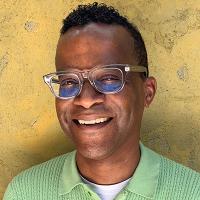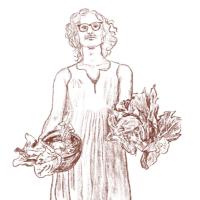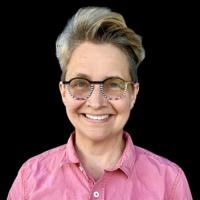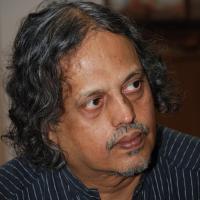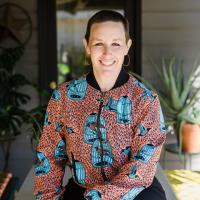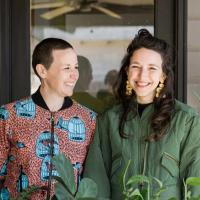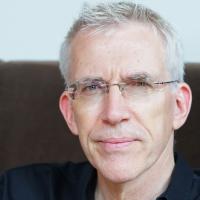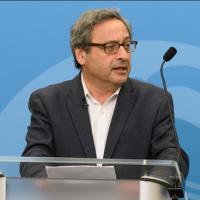Program Overview
In an intensive six-week course of study, faculty members, graduate students and independent scholars from around the world, in the humanities and social sciences, explore recent developments in critical theory.
Participants work with the SCT’s core faculty of distinguished scholars and theorists in one of four six-week seminars. Each faculty member offers, in addition, a public lecture and a colloquium (based on an original paper) which are attended by the entire group.
The program also includes practical Writing Workshops taught by writers and poets who visit for shorter periods. Finally, the program begins with a panel discussion between the SCT Director and two leading figures in the Humanities and ends with an exciting two-day conference. In addition, Cornell offers participants the resources of one of the great research libraries in the United States.
The 2024 summer session at the School of Criticism and Theory will be held in-person in Ithaca, June 9 - July 18, 2024.
2024 Faculty
Six-Week Seminars:
| Stephen Michael BestProfessor of English; Rachel Anderson Stageberg Chair; Director, Townsend Center for the Humanities, University of California, Berkeley "The Black Index" |
Abou FarmanAssociate Professor of Anthropology, The New School for Social Research "Good Death Bad Death"
| |
Stephanie LeMenagerMoore Professor of English and Environmental Studies, The University of Oregon "Climate Humanisms, Fictional Futures" | |
Sundar SarukkaiFormer Professor of Philosophy at the National Institute of Advanced Studies, Bangalore; and founder of Barefoot Philosophers "Philosophies of the Natural and the Social" |
1-Week Writing Workshops:
Nomi StonePoet, anthropologist, Assistant Professor of Poetry at The University of Texas at Dallas and co-founder of Field Studio "Poetry Workshop" | |
Rose SkeltonWriter, journalism trainer, co-founder of Field Studio "Nonfiction Workshop" | |
Nomi Stone & Rose SkeltonCo-founders of Field Studio "Creatively: Writing Craft for Academics" |
Panel Discussion:
Hent de VriesPaulette Goddard Professor of the Humanities; Professor of Religious Studies, German, and Comparative Literature; and Affiliated Professor of Philosophy at New York University "Making the Humanities Legible at the Ends of Capitalism" | |
Andrew DelbancoPresident of the Teagle Foundation & the Alexander Hamilton Professor of American Studies at Columbia University "Making the Humanities Legible at the Ends of Capitalism" |
Course Descriptions
Six-Week Seminars:
The Black Index
Stephen Michael Best
Professor of English; Rachel Anderson Stageberg Chair; Director, Townsend Center for the Humanities, University of California, Berkeley
An index (from the Greek deixis, “to point out”) is a sign that points to the context in which it occurs (think footprint); in poetics, it registers a mutual hereness, a framed habitation for speaker and audience, “the stored activity of the maker [being] simultaneous to an implicit and reciprocal capacity for animation in the receiver,” as Susan Stewart has put it (Poetry and the Fate of the Senses, 149-50). This sense of hereness and thereness is why deixis has given us words such as “predicament” (finding oneself here) and “diction” (a sort of unconscious betrayal of the place from which you came). Linguists capture this sense of immediacy in the idea of “the phatic”: messages exchanged “to check whether the channel works,” where the purpose is to establish and maintain the social bonds of the interlocutors (Roman Jakobson). The burdens of such maintenance make the index a particularly useful portal into what Wittgenstein called shared “forms of life”—but not black ones.
In the black radical tradition, the phatic is often shadowed by the apophatic—black ways of speaking, looking, and listening disruptive of presence and “ordinary” uses of language, by making a show of passing over meaning, or dissuading any attempt to grasp one (think of the indirection of loud talking or the nod that black travelers give one another when in predominantly white spaces). James Baldwin argued that wrestling with these black ways of worlding required the deliberate wreckage of American English (“No true account. . . of black life can be held, can be contained in the American vocabulary. . . [T]he only way that you can deal with it is by doing great violence to the assumptions on which the vocabulary is based.”) Toni Morrison called this listening for “the sound that broke the back of words” (Beloved), and Baldwin’s writings have been described as attempts to commit to the page the experience of hearing in black music things sung which are really unsayable. This course will explore the many strains of apophasis in black thought. From Christina Sharpe’s “anagrammatical” to Fred Moten’s “mu,” Nathaniel Mackey’s “troubled eloquence” to Maurice Wallace’s “black audition,” these modes of sounding unsounding offer an encounter with “the freeness of a black world” (in Kevin Quashie’s phrase). As it has proven profoundly frustrating for the scholarly disciplines to be confronted with this “noise,” one particular goal of this seminar will be to discern intelligibilities that are not accessible through communicative ethics.
Good Death Bad Death
Abou Farman
Associate Professor of Anthropology, The New School for Social Research
This seminar attempts to contend with the question of a good death in a bad life – somewhat changing the orientation of a tension, originally taken up by Adorno then reformulated by Judith Butler, about the systemic political conditions that make life possible and living impossible. The unprecedented movement of global capital as it subsumes geological, natural and social processes, along with drastic geographical, racial, political and military inequality, and the rush of catastrophes that we vaguely categorize as climate change, come together to produce group-differentiated vulnerability to premature death (characterized by Ruth Wilson Gilmore as racism) in a globally entangled matter. This might imply that on a global scale a good death may not be properly possible, and all death today may be to some extent refracted as a bad death. How, specifically then, does the contemporary thus described force us into a reconsideration of death as always a political event and mourning as a political response?
Moving beyond the Western privatization and secularization of grief and the recent hospice-based genealogy of “the good death”, we will take extended relations to the dead – including ghosts, spirits, revenants, and other effects of the afterlife – into account and embrace melancholia to explore mourning as an epistemic and practice-based possibility for political and ethical transformation.
Climate Humanisms, Fictional Futures
Stephanie LeMenager
Moore Professor of English and Environmental Studies, The University of Oregon
Among its many collateral effects, the climate crisis transforms what humanisms mean or aspire to be. The conversation about climate humanisms within the environmental humanities includes explicit discussion of the energy burdens and ordinary violence of modern subjectivities: Our discussion begins with well-known scholars of environmental literary and cultural studies, including Jennifer Wenzel, Ursula Heise, Wai-Chee Dimock, Donna Haraway, Anna Tsing and Rob Nixon. Within an historical framework that foregrounds American settler colonialism and global empire, the question of climate humanisms deepens into dialogue with postcolonial and decolonial thought, and we will ask what supersedes, or thrives in parallel, to Eurocentric/bourgeois humanisms, with philosophers Sylvia Wynter, Kyle Powys Whyte, and Zoë Todd. As anti-colonial “genres of humanism” shift the humanities toward climate consciousness and Indigenous ontologies, they also suggest new assumptions about the economic "human" in post-capitalist forms of property and practice (i.e. commons, restoration ecologies). Can the central concerns of the humanities hold—and do we want that, while once viable pluralist social visions unravel and the world burns? From the ruins of humanisms past, we glimpse futures of cultural experimentation, aggressive conservation, and radical hope. In counterpoint to theory, we will read three speculative fictions from the other side of climate apocalypse, by Cheri Dimaline (The Marrow Thieves), Alexis Pauline Gumbs (M Archive: After the End of the World), and Liz Jensen (The Uninvited).
Philosophies of the Natural and the Social
Sundar Sarukkai
Founder of the Manipal Centre for Humanities, Manipal University; former Professor of Philosophy at the National Institute of Advanced Studies, Bangalore; and founder of Barefoot Philosophers
“Natural” and “Social” are two of the most important concepts upon which modern knowledge systems are built. A broad range of disciplines grouped under the categories ‘Natural Science’ and ‘Social Science’ reflect the centrality of these notions. However, there are fundamental ambiguities present in the many conceptualisations of these terms. These terms are used technically in academic discourse but also have a powerful currency in popular usage. No wonder, it has been claimed that ‘natural’ is the most ambiguous term in the English language. Social fares no better! Yet, it is impossible not to use these terms or to artificially restrict their meanings. In this seminar, I want to explore the philosophical and cultural conceptualisations of these terms with particular interest in the epistemology produced under the names ‘natural sciences’ and ‘social sciences’. We will explore how nature and the natural are configured to fit the ideals of the disciplines of natural sciences in the same way that society and the social are in the creation of the social sciences. The topics that will be discussed include the history and philosophy of the natural and the social from different cultural traditions, the conditions for producing knowledge of the natural and the social, the tension between the natural and the social in the context of human languages, the union of the natural and the social in diverse ways including a sociology of the individual senses as well as the formulation of social minds, the formation of natural authority as well as social authority, social and natural ontologies, and their relation to social action. The seminar will primarily draw upon both the philosophy of the natural sciences as well as that of the social sciences, and will follow the spirit of critical philosophical reflection rather than a history of philosophy. It will also deal extensively with the social consequences of these conceptualizations, particularly related to caste, gender and race.
Writing Workshops:
Poetry Workshop
Nomi Stone
Poet, anthropologist, Assistant Professor of Poetry at The University of Texas at Dallas and co-founder of Field Studio
The anthropologist Paige West writes: "Each and every one of us is a living assemblage of every embrace, every conversation, every argument, every meal shared, every laugh had....And each of us leaves a trace on others." How might we document these traces, finding an otherwise through new tools of representation? Through sensory attunement and an apprenticeship to poetic craft, we will practice writing poems that engage embodied experiences with the world. We will practice image, metaphor, linebreak, and sound, among other devices, offering the participants a formal toolkit. As the poet Tina Chang writes: "“I am not the same as I was yesterday, and form allows me to speak to this fact."
Nonfiction Workshop
Rose Skelton
Writer, journalism trainer, co-founder of Field Studio
Bringing one's own experience onto the page can be exhilarating, and thoroughly daunting. Sharing our story with others can make us feel exposed and––especially as academics––wide open for critique. But it is our personal experience that allows us to have a voice, one that sets our work apart from others', and 'voice,' as you will find out in this workshop, is different from merely delivering personal information. In this workshop, we will study the tools of creative prose writing––narrative movement, character, tension, stakes, distance, and time––and practise using them to write original, well-made, and vivid prose. You will also learn how to decide which details in your life can be used to engage with your ideas, either in academic writing or in non-academic prose. By the end you will have an idea of what we mean when we talk about 'voice,' and the tools with which to hone yours.
Creatively: Writing Craft for Academics
Nomi Stone and Rose Skelton
Co-founders of Field Studio
For those of you who are spending the summer working on your book manuscripts, Creatively will help you to write more vividly. You will learn how to more richly write scenes (interviews, observations, setting and place) from your fieldwork with a fiction and creative-nonfiction writer, and consider sentence structure and image with a poet. You will also think about how to enact theory within lyrical and narrative writing. Ultimately, you will bring these techniques into your own academic writing to both move your readers and reach a broader audience.
Course Previews
Stephen Michael Best, "The Black Index":
Abou Farman, "Good Death Bad Death":
Stephanie LeMenager, "Climate Humanisms, Fictional Futures":
Sundar Sarukkai, "Philosophies of the Natural and the Social":
Writing Workshops:
2024 Brochure
Apply
The online application portal will close on the deadline of February 1, 2024.

